Aug 2021 1st edition
Aug 2021 1st edition vuyelwan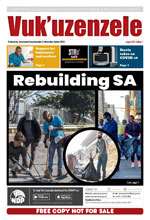
Translations
Afrikaans
isiNdebele
isiXhosa
isiZulu
Sepedi
Sesotho
Setswana
Siswati
Tshivenda
Xitsonga
Call for nominations for Council Members to serve at Northern Cape Community Education and Training College
Call for nominations for Council Members to serve at Northern Cape Community Education and Training College vuyelwanCall for nominations for Council Members to serve at Northern Cape Community Education and Training College in terms of section 10 (4) (b) of the continuing education and training act no. 16 of 2006 (as amended)
The Minister of Higher Education, Science and Technology invites members of:
(a) the public;
(b) community education and training colleges, student representative councils of community education and training colleges, universities, universities of technology, other higher education institutions, private higher education institutions, private colleges, technical and vocational education and training colleges, the distance education sector, educators, lecturers, organised business, organised labour, provincial governments, municipal governments;
(c) members of the business community;
(d) research and science councils; and
(e) relevant non-governmental organisations
To nominate persons by virtue of the fact that they can give expression to:
- ensuring that the functions of the council are performed according to the highest professional standards;
- ensuring that the council is broadly representative of the continuing education and training system and related interests;
- ensuring that the council members have a thorough knowledge and understanding of the continuing education and training sector, including the functions identified and applicable to Community Education and Training (CET) College as promulgated in the White Paper on Post-School Education and Training;
- appreciating the role of continuing education and training in reconstruction and development; and
- ensuring that the council is broadly representative of the demographics of the community to be served by the public CET College in respect of gender, race and disability.
Nominations should be made using the nomination form obtainable from the Departments website at www.dhet.gov.za or email kodisang.e@dhet.gov.za or call 012 312 5750. Nomination forms must be accompanied by a comprehensive curriculum vitae with certified copies of qualifications.
Nominations made in reply to this notice must be submitted by 31 August 2021. The nominations must be submitted to:
The Director-General, Department of Higher Education and Training,
Attention: Deputy Director-General: Community Education and Training,
Private Bag X 174, Pretoria, 0001
SCHEDULE
College which have vacancies in terms of section 10 (4) (b)
|
Province |
Name of College |
Physical Address |
Number of Vacancies |
|
Northern Cape |
Northern Cape CET College |
19 Oliver Road Monument Heights Klisserville KIMBERLY 8301 |
Five (5) |
Department of Higher Education and training
Catch a PickUp Cab in Limpopo
Catch a PickUp Cab in Limpopo UrsulaA young entrepreneur encourages the youth to develop local products to boost the economy, just like he has done. 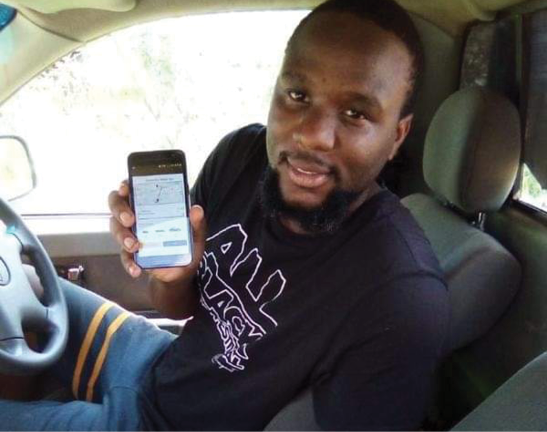
Growing up with no reliable public transport in his rural hometown motivated Ntebatse Sekgodiso (30) to use his passion for technology to create an e-hailing app called PickUp Cab to solve the problem.
Sekgodiso, from Medingen Village in Limpopo, says his idea to provide reliable transport also created employment in the area, as people who lost their jobs as a result of the Coronavirus Disease lockdown became drivers.
“My friend and business partner Senzo Mkhize also loves that we are playing our part in fighting unemployment,” he says.
Sekgodiso and Mkhize started working on PickUp Cab in July 2020 and launched it on Google Play Store in late December. It has been operating ever since and is regularly updated and improved.
“PickUp Cab is a proudly South African initiative and this makes us proud. The money generated stays in our country, so I can proudly say our app is contributing to the economy,” says Sekgodiso.
PickUp Cab’s drivers operate in Kgapane, Lenyenye, Nkowa, Tzaneen, Turfloop and Polokwane and get 10% of the cost of the trip.
“We did not just want people to have reliable public transport, we also wanted to make it affordable for them. We also considered that our drivers need to wash and service their cars and buy petrol, so we need to charge reasonably,” says Sekgodiso.
The company, which is sifting through applications from prospective drivers, has a rigorous verification process to ensure passenger safety.
Relevant paperwork has to be supplied when drivers register their car, or their application is rejected. This helps us ensure that our drivers are legally allowed to transport people,” says Sekgodiso.
He hopes to expand the business beyond Limpopo.
“We would like to see PickUp Cab operating nationally in the near future. The long-term goal is to operate in other African countries and contribute to the economic growth of Africa as a whole.”
Sekgodiso’s success is the result of years of technological trial and error. He developed his first website in high school and has not looked back.
To download the app, search PickUp Cab on Google Play Store.
Celebrating SA’s women
Celebrating SA’s women BathandwaThis Women’s Month, which is commemorated annually in August, women from all walks of life celebrate the freedoms they did not have pre-1994.
Women’s Month pays tribute to the more than 20 000 women who marched to the Union Buildings on 9 August 1956, in protest against the extension of Pass Laws to women.
These brave women fought for their rights and freedom and are celebrated on 9 August, which was declared Women's Day.
Post-1994, the South Afri- can government prioritised the release of women from many limitations making it possible for them to reach their full potential.
Government ensured that women in the democratic South Africa enjoy the same freedoms and rights as men, by developing policies prioritising women in employment and business opportunities.
This has seen many women in the country, in both the public and private sectors, rise to high levels of management and leadership and occupy positions they were previously not allowed to.
This year has been named the year of liberation struggle heroine and human rights campaigner Charlotte
Maxeke. She is the second woman to be memorialised and honoured in this way. In 2018, struggle icon Albertina Sisulu was honoured in a similar manner. Maxeke had an impact in many areas, including education, faith and politics.
Vuk’uzenzele spoke to four women of different ages and interests, to find out what being a woman in South Africa means to them. These women have had their lives changed, thanks to government programmes and opportunities.
An entrepreneur with two businesses
Portia Malinga (36), a professional chef and an entrepreneur, from Winterveldt in Pretoria, runs two successful businesses.
She owns Dijo Tse Porche (Pty) Ltd, a cooking business, and LA Arrow Technologies (Pty) Ltd, an information technology (IT) business.
LA Arrow Technologies supplies hardware, software, consumables and on-site IT services. Malinga provides services to government departments, state-owned companies
and the private sector.
“La Arrow Technologies gets 90% of its business from government. This has been made possible through broad-based black economic empowerment and the exempted micro-enterprise, which give empowerment and preferential points for businesses owned by black South African women,” explains Malinga.
She is thankful for the efforts made by the government to ensure women-owned business thrive.
Malinga encourages other women to make the most of the opportunities provided by government.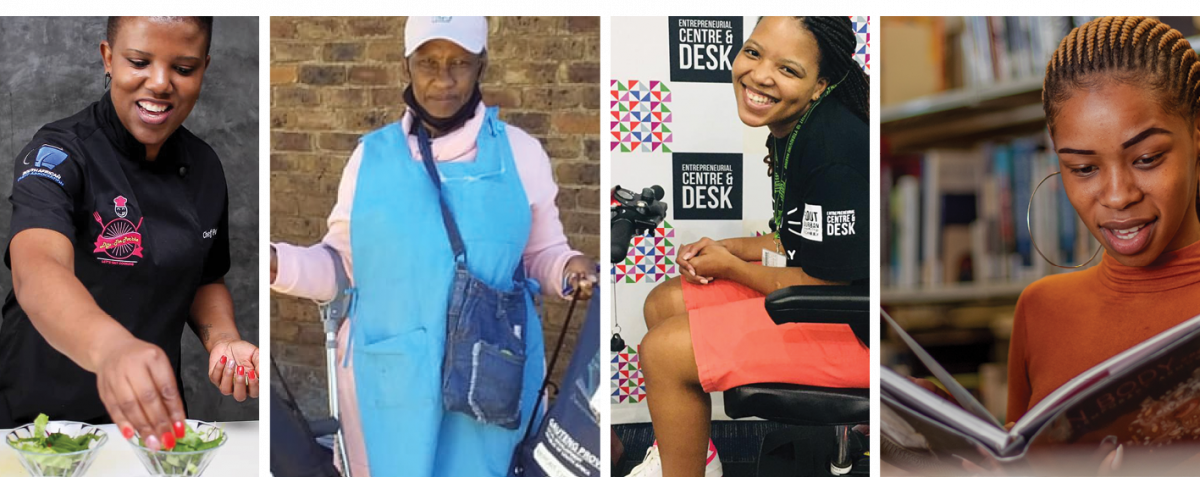
Inspired to grow
Evelyn Mashinini (57) is the Chairperson of Hold Hands Together Cooperative in Tembisa.
She started the cooperative in 2012, when she gathered unemployed women and youth and started teaching them how to sew, crochet, bead and knit.
“Working together has helped us access business opportunities in government. Between 2015 and 2017, I was contracted by the Department of Social Development to make school uniforms for the children they provide for. I got the contract again this year,” she says.
The department also helped the cooperative to make reusable face masks.
Apart from these projects, Mashinini says she has received equipment, including sewing machines and overlockers, from the Gauteng Enterprise Propeller, Department of Trade and Industry and Ekurhuleni Municipality.
“We are given opportunities as women to start our small businesses. We now want to move forward by having cooperative
access the bigger markets,” she says.
Disability not a limit
Nqobile Khuzwayo (25) from Newlands West in KwaZulu-Natal is a business information management student and a disability grant recipient.
She commends government for widening access to higher education for people living with disabilities.
“I was declared brain dead, but today I am at university passing my modules with distinctions.
“Back in the day, people with disabilities were not given opportunities to study, but now more opportunities are open for people living with disabilities,” she says.
Khuzwayo now empowers other women with disabilities. She encourages women not to limit themselves because of their conditions.
Free access to higher education
Nande Faku (22) from Mthatha in the Eastern Cape graduated with a national diploma in journalism this year.
During her studies, she was a beneficiary of the National Student Financial Aid Scheme. The funding paid for her tuition, private accommodation of R3 400 a month and a meal allowance of R1 500 per month.
“Being a woman in South Africa today is so much better compared to what the generations before us had to go through.
“I mostly appreciate that I am able to choose any career I want, without being excluded, as we are told it happened to many women before 1994,” she says.
Dear Bella helps keep girls in school
Dear Bella helps keep girls in school BathandwaMany girls no longer have to miss school during their menstrual cycle as they are receiving sanitary pads for free.
The growing need for affordable sanitary pads prompted Matefo Morakeng to start her own business, Dear Bella, in the Free State.
Morakeng established the company, which she named after her mother, in 2018.
“I noticed girls would visit the clinic to get medication to stop them from menstruating because they couldn’t afford sanitary pads. I knew I had to do something bigger than just donating to a few,” says Morakeng. 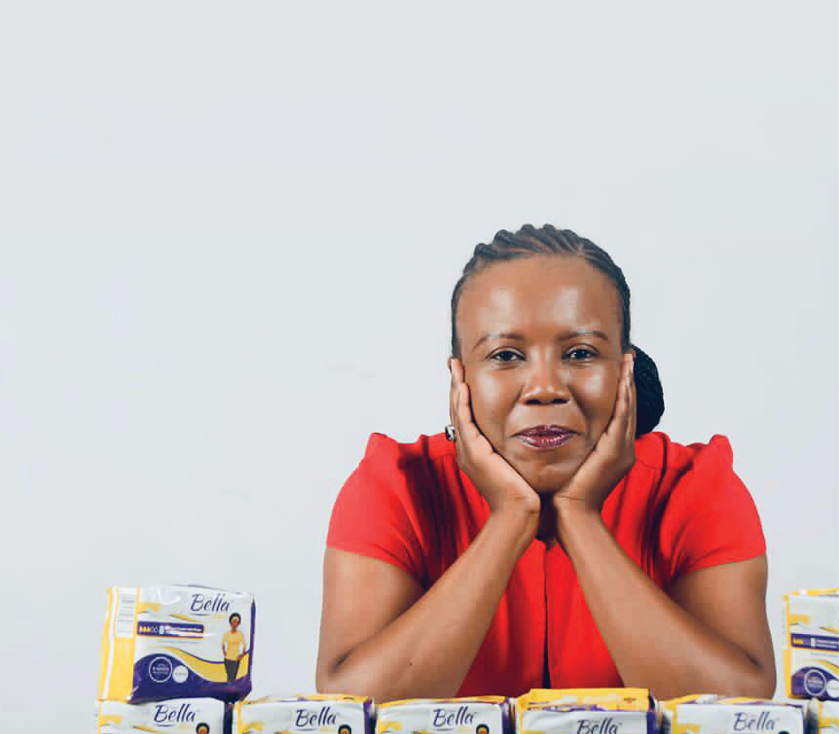
Realising that establishing a manufacturing facility isn’t easy, Morakeng opted to rather use a contract manufacturer and create jobs locally.
“Dear Bella is more than a sanitary pad brand. It is specifically aimed at providing for women and girls in less privileged homes.
“The prices of sanitary pads are too high, so we’ve priced our product at R10 per pack, compared to the usual price of between R20 and R30. This, however, doesn’t compromise on quality,” she says.
Morakeng used to only supply local stores and supermarkets in Bloemfontein. Her product was then spotted by officials from the Department of Small Business Development, who selected it as one of the 1 000 locally produced products to be procured by government through its localisation programme.
“Officials from the department saw my product at Cash & Carry in Qwa Qwa and helped me obtain a distribution deal with Dischem, through the SMME Focused Localisation Policy Framework,” says Morakeng.
As a result, Dear Bella now has offices in Bloemfontein and Johannesburg and is distributed in Gauteng, Limpopo, KwaZulu-Natal, the North West and Lesotho. There are also plans to expand the range.
Due to its growth, the company is now also able to sponsor a number of girls with sanitary pads monthly.
“The initiative, called Guardian Angels, encourages people to sign up and donate R99 per month to sponsor sanitary pads for girls. We get requests from different areas and schools.
“The aim is to provide the girls with something that is crucial to their hygiene, while inspiring them with a woman-owned local product,” she says .
For more information about Dear Bella, visit www.dearbella.co.za.
Dr Ngwako Sebopetsa, the world’s number one principal
Dr Ngwako Sebopetsa, the world’s number one principal BathandwaA Limpopo primary school principal has received global recognition.
Rathaga Primary School principal, Dr Ngwako Sebopetsa, recently received the Global Principal Award from India-based Alert Knowledge Service for excellence in school leadership and management skills.
Based in the Mopani East District in Limpopo, the school’s learner enrolment has grown from 550 to over 800 under Sebopetsa’s guidance over the past five years.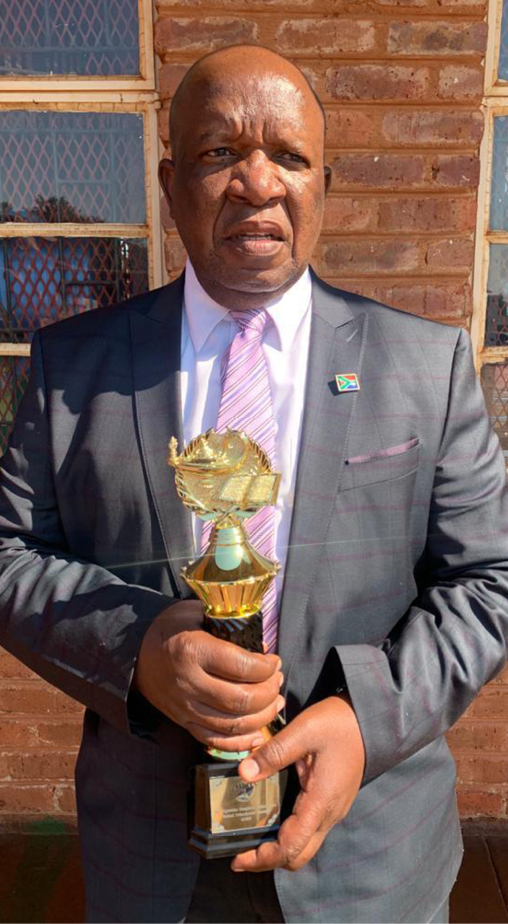
He says his passion for education has been well received by his learners, who made it possible for him to win the award.
“I am highly committed to my work and the learners’ performance is beyond expectations© This is an indication that parents are super satisfied with my leadership and management skills,” he says.
Sebopetsa’s award follows his recent success in the National Teaching Awards, where he received a certificate for being the best compliant principal in the Rakwadu 1 Circuit.
He says he received the certificate thanks to the relationships he has built with his colleagues, the school governing body and officials from the Department of Basic Education.
Sebopetsa’s relationship with learners and parents is one of being a mentor.
“They have confidence in me to resolve conflicts in such a way that all parties are satisfied. The school has a code of conduct, adopted by all stakeholders, to address problems such as bullying,” he says.
In 2013, Sebopetsa was appointed as the caretaker principal of Matome-Modika Secondary School. During his tenure, the pass rate increased from 25% to 75%.
To build such strong and successful relationships with schools, Sebopetsa says teachers should be passionate about the profession and work hand-in-hand with their communities.
He believes that teachers should lead the way by being educated themselves. Sebopetsa holds a Doctor of Education, specialising in education management, from the University of Venda.
“I have five degrees, five diplomas and many other certificates. I also authored a book titled ‘Communication with myself’ and various articles,” he says.
Sebopetsa is also a part-time Campus Coordinator at the University of the Free State.
Graduates bake their way to success
Graduates bake their way to success UrsulaFrustrated from being unemployed, two Durban graduates taught themselves how to bake and opened a bakery. 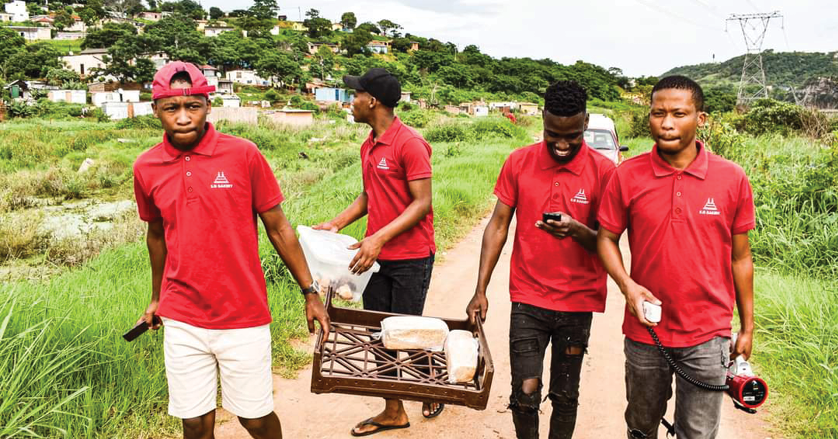
SG Bakery co-founder Siyanda Shabane (30), from Umlazi, spent six months at home applying for jobs after graduating. Failing to secure one, he and his friend Mbonisi Gumede (30) started watching baking tutorials.
“I would watch these videos, bake and give the goodies to my family to taste.
“When I gained confidence, I bought more ingredients and a container and started baking to sell to the public,” recalls Shabane.
On his first day selling, he returned with a container full of unsold goods. However, on the second day, he sold everything and his business picked up from there.
Gumede then joined Shabane and the two started baking together.
“We waited for my family to finish in the kitchen and then baked what we wanted to sell in the morning. It was very rough, but we enjoyed doing it,” says Shabane.
As sales increased, they hired seven youth to sell their goods in industrial areas. They then erected a shack outside Shabane’s home, as the family kitchen was too small for their daily production.
Putting bread on the table
During the Coronavirus Disease lockdown, they had to stop selling as people had to stay at home. Shabane says this gave them an opportunity to try their hand at baking bread.
“We started selling loaves of bread in May 2020 and now demand is high. To date, we have baked 24 000 loaves.
“Our clients are non-governmental organisations, individuals, schools, households and clinics. We currently produce between 120 and 150 loaves a day,” he says.
eThekwini Municipality has supported the duo with raw materials and Hollywoodbets recently sponsored furniture and a 12-metre shipping container, which they turned into a bakery.
“Hollywoodbets's sponsorship made a huge difference. We were in desperate need of a proper workspace. People are observant and based on the place you sell from, decide to come in or go elsewhere,” says Shabane.
The bakery now employs 12 people and aims to hire more from the community.
“Just like me, there are people who couldn’t get jobs after graduating. We want to give them an opportunity to make a living,” says Shabane.
Help for families, businesses in need
Help for families, businesses in need vuyelwanAs South Africans struggle to deal with the aftermath of the unrest that affected some parts of the country recently, government is hard at work putting together measures to help people and businesses.
During an address to the nation, President Cyril Ramaphosa said government will take steps to support households and help businesses restock and rebuild.
“We are in the process of providing immediate food relief to households. We are targeting areas affected by the looting and where people have no access to food,” he said.
Provincial Departments of Social Development and the South African Social Security Agency will provide support to those in need through food parcels, cash and food vouchers.
“To assist with the immediate needs of affected communities, the Solidarity Fund has established a Humanitarian Crisis Relief Fund to assist those in greatest need at this time. We are calling on all South Africans to support this fund,” added President Ramaphosa.
Long road ahead
He said the effects of the violence will be felt by all South Africans in the weeks and months to come.
“The damage that has been done to vital economic infrastructure will take time to repair.
“This in turn will have an impact on the availability of food, fuel, medicine and other supplies not only in South Africa, but across the region.” 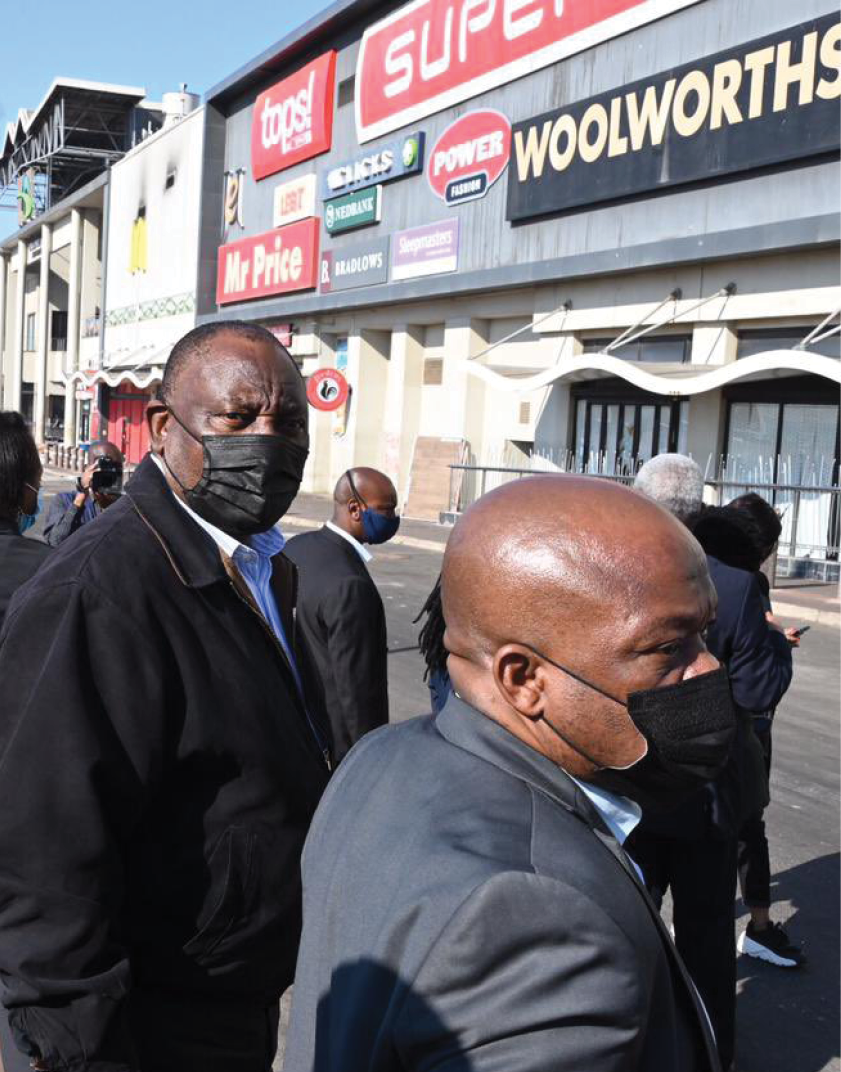
The violence and destruction has further damaged the country’s economy, which has already been severely affected by the Coronavirus Disease (COVID-19) pandemic.
The President warned that the destruction of businesses would likely lead to more job losses.
“Ultimately, it will deepen poverty and cause even greater hardship for millions of South Africans.”
Support for families
A number of companies, organisations and faith-based groups have already started providing support to families in need.
“Social partners have been meeting to discuss a range of measures which can be implemented to provide immediate relief...This includes the provision of emergency food relief and other assistance to those in greatest distress,” said President Ramaphosa.
Government will also help small businesses, including those in townships and rural areas, to recover from the damage they have suffered.
“Our business people provide important goods and services in our communities, and we will help them to rebuild their businesses.”
A team in The Presidency and National Treasury is already working on a comprehensive support package for Cabinet to consider.
Loss of lives
Since the outbreak of the violence in July, at least 212 people have lost their lives. Of these, 180 have been in KwaZulu-Natal and 32 in Gauteng.
More than 100 incidents of public violence, arson, looting and other incidents have been recorded. Most of these incidents took place in Gauteng and KwaZulu-Natal and more than 3 400 people have been arrested.
“The destruction of property and theft of goods has cost businesses, consumers and the country as a whole billions of rands,” said the President.
Extensive damage has been caused to 161 malls and shopping centres, 11 warehouses, eight factories and 161 liquor outlets and distributors.
Attack on democracy
President Ramaphosa said the unrest and looting were part of a deliberate, coordinated and well-planned attack on the country’s democracy.
These actions were meant to cripple the economy, cause social instability and severely weaken – or even dislodge – the democratic state, he added.
“Using the pretext of a political grievance, those behind these acts have sought to provoke a popular insurrection.
“They have sought to exploit the social and economic conditions under which many South Africans live – conditions that have worsened since the onset of the COVID-19 pandemic – and to provoke ordinary citizens and criminal networks to engage in opportunistic acts of looting.”
The President said despite the damage that has been done, those behind the unrest failed to gain the support of the majority of South Africans.
“It has failed because of the efforts of our security forces, and it has failed because South Africans have rejected it and have stood up in defence of our hard-won democracy.”
During the unrest, President Ramaphosa deployed 25 000 members of the South African National Defence Force to support the work of the police.
He commended the efforts of individuals, organisations and communities who helped restore calm and protect lives, property and infrastructure through peaceful means.
“We thank all those people who have remained at their posts under difficult and dangerous conditions, providing services to our people and our nation – the law enforcement personnel, healthcare workers, social workers, security guards, municipal employees and many other frontline public servants.”
The President called on South Africans to stand together to defend the country.
Making products from indigenous plants
Making products from indigenous plants UrsulaThe Council for Scientific and Industrial Research (CSIR) is researching indigenous plants to develop sustainable food products, herbal-based medicines and cosmetic alternatives in South Africa. 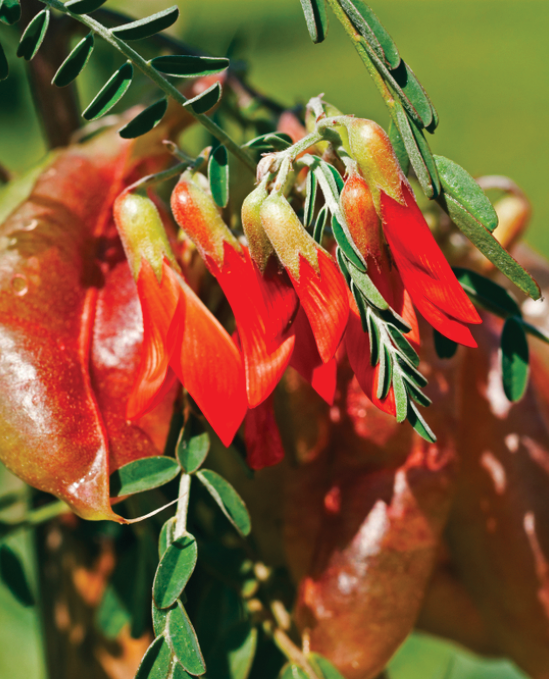
Trishen Reddy and Lucia Sethunya, who are both junior researchers and process technologists at the CSIR, are part of the Indigenous Knowledge Systems Research Programme (IKS) that helps communities, producers and traditional healers produce safe, quality products.
The team works with plants found in Southern African countries, such as Namibia, Lesotho, Botswana and South Africa.
The researchers used Aloe ferox (Cape Aloe) to produce gels and cosmetic lotions, Hoodia gordonii (Bushman’s hat) to produce an appetite suppressant and Lippia javanica (umsuzwane) to produce a mosquito repellent.
The Traditional Healers’ Committee approached the CSIR with indigenous knowledge of umsuzwane, which inspired the research.
“The CSIR developed a technique to extract and enhance the compounds found in the plant on a commercial scale, and it is available on the market,” says Reddy.
She adds that the CSIR identified a novel chemical compound that repels mosquitos and filed for a patent in South Africa.
It also entered into a benefit sharing agreement with the Traditional Healers’ Committee and applied for a bio-prospecting permit to commercialise the technology.
Other plants that have been researched are Siphonochilus aethiopicus (African ginger) and Sutherlandia frutescens (cancer bush), which were produced as teas to use in traditional medicine to treat colds and flu.
Reddy says the team helps local communities to sustainably farm and process the plants.
“The team invites stakeholders to see what equipment is needed and how to use it, to ensure the products are produced to the same quality and safety standards.
“We also train communities and stakeholders to use equipment to develop plant-based products, leading to transferable technologies and skills creation.”
Sethunya adds that the team made a jelly using Aloe castanea (sekgopha or cat’s tail Aloe) that is used in skin remedies to moisturise and protect the skin.
They also developed a tissue oil from Moringa oleifera (tree of life) that has antimicrobial and antioxidant properties and is used to smoothen, soften and moisturise skin.
New app is ScamProof
New app is ScamProof UrsulaA new app has been developed to help people determine if a job opportunity is a scam and if tertiary education facilities are registered. 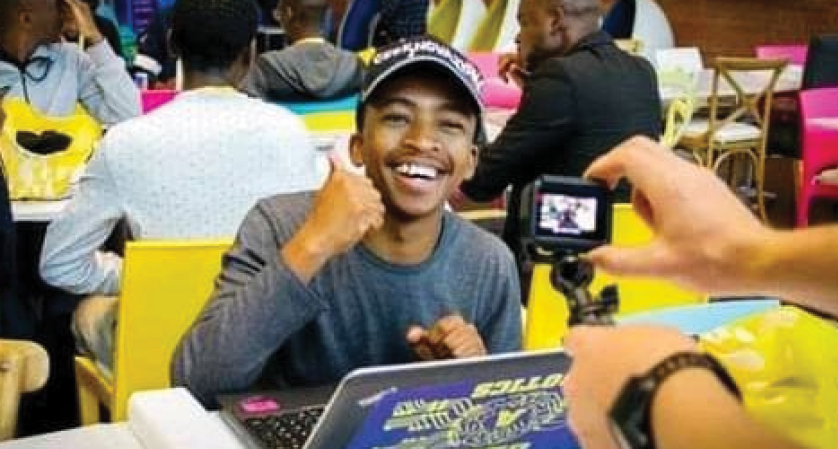
A self-taught computer programmer has developed an app for people to detect scams and help prevent human trafficking.
Anathi Mseleni (24), from Diepsloot in Gauteng, recently made the ScamProof app available on the Google Play Store for download.
Fascinated by the use of technology to solve social problems, Mseleni became concerned when he realised that many youth lack awareness of scams and register at bogus colleges or fall for fake jobs as a result.
“People are scammed of their money or kidnapped by people who advertise fake jobs. I wanted to build a platform where they can report scams and make others aware of them,” he says.
The app enables users to report scams from across the country and to check if tertiary institutions are registered.
“The app is free to use and open for the public to comment on. I cover all of the operational costs. No one is hired to report scams, the app uses information from the public,” says Mseleni.
Users can search a company’s name, address, email address or contact number, and the app will display results if the company has already been flagged as a scam.
“Not all scams have been reported on the app, which is a disadvantage, but more will appear as they are reported by members of the public,” he explains.
Mseleni also wants companies across the country to register as safe zones on ScamProof. When women do not feel safe, they can go to these premises and will be able to get directions to the safe zone from the app.
Mseleni, who didn’t study programming, says he enjoys solving problems and coming up with new ideas.
“I started learning how to code in 2016, when I was 19. I was passionate about coding and taught myself using books, YouTube videos and online coding forums,” he says.
ScamProof can be downloaded from the Google Play Store .
Ntsako Shipalana grows the poultry sector
Ntsako Shipalana grows the poultry sector BathandwaNtsako Shipalana is not only a successful chicken farmer, she is also giving back to the industry by training others.
Shipalana, from Tzaneen in Limpopo, owns Olori Chickens, which she established in 2017.
“As I grew in the industry, I realised that there are people who are interested in learning about it, but don’t know where to start. I decided to close that gap by teaching. 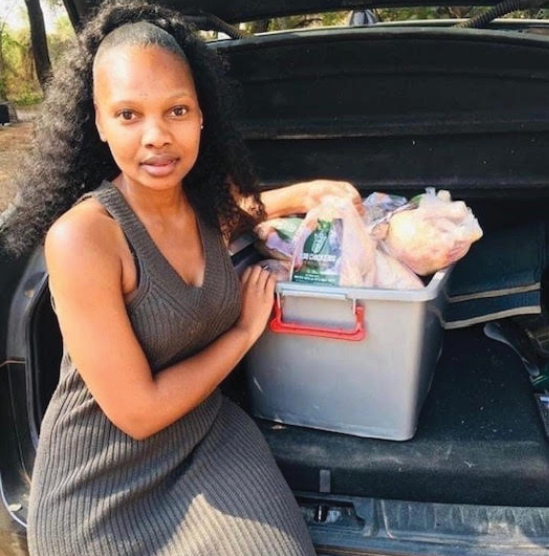
“It is honestly beautiful to watch people being able to stand on their own, knowing I played a little role in that,” she says.
Shipalana’s desire to see more people earn a living because of her training sessions resulted in her developing a training manual.
“I was raised by parents who always encouraged us to be in business and create great opportunities for ourselves, while also empowering others,” she says.
Although she is based in Limpopo, people reach out to Shipalana from all over the country.
This makes her feel as if she is making a meaningful contribution.
“Each day I receive positive feedback from the people I have assisted. We recently celebrated someone who attended our seminar and is now supplying a Pick n Pay outlet. This is a milestone,” she says.
Shipalana encourages people to start with what they have, as this will help them to gain the experience they need when setting up large workspaces.
“It is better to have opportunities find you when you’ve already started,” she says.
Shipalana’s parents helped her to start the business, which also received a financial boost from the National Youth Development Agency (NYDA) after its first year.
Shipalana initially started the business raising chickens, but later expanded to selling them ready to cook to save time for her customers.
The business currently employs three people and the chickens are sold to households, middlemen and shisanyama owners.
“Growing up around agriculture made it so easy for me to fall in love with poultry. My father had layers and that boosted my desire for broiler production,” she says.
For more information about the NYDA and the assistance it offers, visit www.nyda.gov.za or call 087 158 6345.
Opportunities for farmers
Opportunities for farmers UrsulaPreviously disadvantaged farmers can apply for assistance from the Eastern Cape Department of Rural Development and Agrarian Reform. 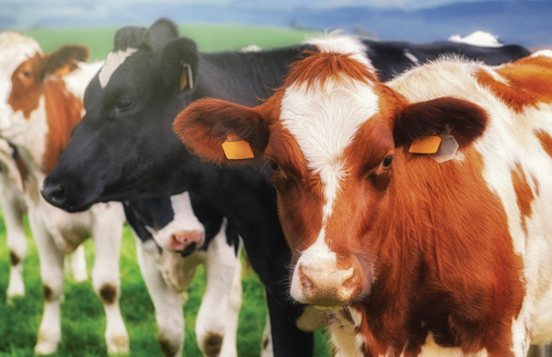
The Eastern Cape Department of Rural Development and Agrarian Reform is calling on emerging livestock farmers and those interested in crop production to apply for inclusion in its programmes to help the previously disadvantaged.
According to the province’s MEC for Rural Development and Agrarian Reform, Nonkqubela Pieters, the Livestock Production Improvement Scheme aims to improve the genetic makeup of herds and flocks to help subsistence and small holder farmers.
Emerging livestock farmers are invited to apply to receive livestock as part of the scheme, which is one of the department’s agricultural programmes that have been put in place to promote, support and facilitate farming development.
The beneficiaries will be provided with pure bred bulls and rams.
The heifers and ewes are earmarked for youth, women and people with disabilities, who have farms that are not stocked below 30% of their capacity.
Applicants need to meet various criteria, including being registered on the producer/farmer database; already involved in the livestock farming sector and owning the type of livestock they apply for; and having a medium- to long-term legitimate right to use the land in their application.
“Applicants must demonstrate the capacity to be able to look after the number of animals they are applying for.
“In rural communities, we encourage farmers to apply as associations or commodity groups,” says MEC Pieters.
Each bull that will be given to the beneficiaries is valued at R3 000; while ram and buck are valued at R800 each.
Crop farming opportunities
Indigent individuals and families interested in crop farming can apply for inclusion in the department’s food production programme.
The department developed the Vulnerable Household Food Production Programme to enable people who are dependent on the state to grow their own nutritious food.
Applications will be accepted from people who are registered on their municipality’s indigent household register or those of the Department of Social Development or Department of Health.
Successful beneficiaries will be supplied with food production input and gardening equipment.
Applications close on 31 August 2021. All application forms and detailed information about these opportunities are available at www.drdar.gov.za
Organ donation, the gift of life
Organ donation, the gift of life BathandwaOne way of making a meaningful contribution to the lives of others after your death is by signing up to become an organ donor.
This simple act has the potential to save many lives.
Organ Donor Month, commemorated in August, aims to create awareness around organ donation and how it saves lives.
According to the South African Organ Donor Foundation (ODF), there are 4 300 adults and children waiting for organ and cochlear donations, with an estimated 325 000 registered donors.
Samantha Nicholls, the Executive Director of ODF, says the Coronavirus Disease (COVID-19) has disrupted organ donation.
Many resources have gone into the pandemic; transplant coordinators have been assigned to other areas, making it difficult for some patients awaiting a transplant to get help; and organs from people who died from the virus can’t be used.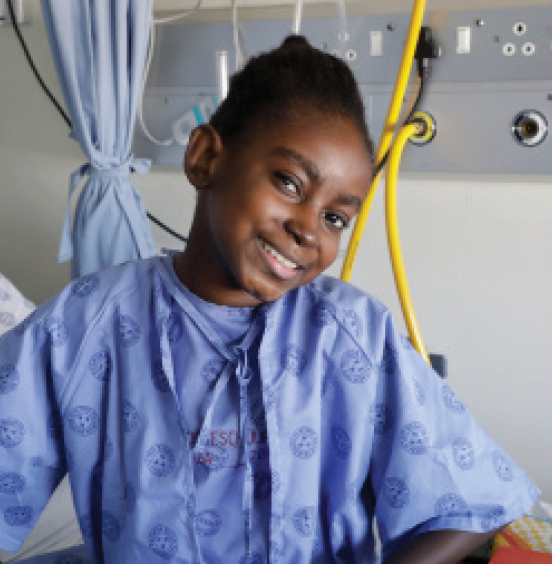
“Despite all of these challenges, we still have hope and stay positive,” says Nicholls.
New lease on life
One organ donor has given Parusia Muhigirwa (13) a new lease on life.
Muhigirwa underwent a heart transplant at the Red Cross War Memorial Children’s Hospital in the Western Cape recently.
The life-changing surgery was the first to be conducted at the hospital in 13 years.
Muhigirwa was diagnosed with dilated cardiomyopathy – a condition in which the heart muscle becomes weak, floppy, enlarged and dilated – and was in heart failure before the transplant.
Professor Liesl Zühlke, the hospital’s Paediatric Cardiologist, says some children are born with abnormal heart structures.
“Some we are able to repair via operations, but sometimes a heart transplant is the only option© Having a heart transplant is a carefully considered, joint decision between family, child and the team.”
The follow-up process entails monthly check-ups that include echocardiograms, blood tests and an array of assessments.
Become a donor
Nicholls says there are two types of transplants – organs and tissue.
“The organs (heart, liver, pancreas, kidneys and lungs) can save seven lives. The tissues (corneas, bone, tendons, heart valves and skin) can help up to 50 people© By becoming a donor, you can help preserve life when yours comes to an end.”
Any person in good health and clear of chronic diseases will be considered as a possible donor.
For more information about organ donation, visit the ODF website at www.odf.org.za
Pandemic sparks good deeds
Pandemic sparks good deeds vuyelwanA church congregation in Ga-Rankuwa, north of Tshwane, is doing all it can to assist the needy during the COVID-19 pandemic.
South Africans have been hard-hit by the Coronavirus Disease (COVID-19), with many losing loved ones and struggling to earn a living during these difficult times. 
But the pandemic has also resulted in stories and acts of hope, with people standing together and offering each other help and support.
This is the case for the Ga-Rankuwa community in Gauteng.
Following the Level 5 lockdown in March last year, the Ga-Rankuwa Presbyterian Church’s Reverend Thando Mpambani put a Church in Society Committee in place to help people in need.
“The journey started with the vision to support the needy. We initially identified 12 families that were in dire need. The needs varied, but a common theme was food,” says committee Chairperson Khutjo Leburu.
The committee rallied the church’s congregation and neighbours to put substantial food parcels together.
“COVID-19 continues to have a profound effect on society, therefore it’s everyone’s responsibility to share the little we have with those in need. Instead of just having a food drive, we decided to run various drives.
“This year alone we have distributed school shoes to needy families, thousands of second-hand and new shoes to Shoes4souls, toiletries to 86 Grade 7 learners at Ikageng Primary School and we are busy with a blanket drive,” says Leburu.
While the Level 5 lockdown is a thing of the past, its effect still lingers and many families are still struggling to recover financially.
Leburu says that as long as there are families in need, the church’s work in the community is not done.
“Churches, as institution of God, are mandated to support others and fulfil the Messiah’s mission. It is time churches start playing active roles in the community, open their doors to the needy and stop operating in isolation. We aim to continue to do this,” she adds.
Partnership grows livestock farmers
Partnership grows livestock farmers UrsulaGoat and sheep farmers are benefiting from a training programme that helps them sell their products to international markets. 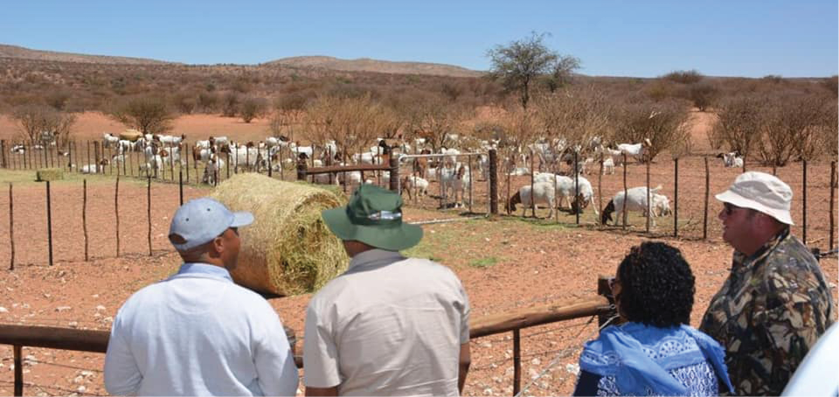
Goat and sheep farmers in the Northern Cape are now able to export their products, thanks to a successful partnership that ensures goat and sheep products are of the highest quality.
The Kalahari Kid Cor- poration (KKC) is a joint initiative between commercial promotors, the Northern Cape Provincial Government and emerging farmers in the province.
KKC’s mission is to promote increased production and provide expertise for improved livelihoods, a sustainable rural economy and food security for all.
Overseen by the province’s Department of Agriculture, Environmental Affairs, Rural Development and Land Reform, the KKC assists farmers to commercialise the goat industry by marketing goats and goat products, says the KKC’s Chief Executive Officer, Dan Kekana.
It also helps farmers to establish cooperatives.
“We provide training to the cooperatives and lend good rams to farmers to improve the genetic material of their herds,” he adds.
To date, the KKC has helped establish 95 goat cooperatives and trained over 1 000 farmers on how to farm goats that meet export requirements.
Once the goats are grown and meet the necessary standards, the farmers sell them to the KKC, which slaughters them and sells the carcass and meat cuts to various markets.
“The KKC’s objective is to market goat and sheep meat, offal, leather, milk and fibre,” says Kekana.
He adds that the KKC brand has been developed to compete for shelf space nationally and internationally.
“The meat sold by the KKC is among the best in the world© We also have excellent in-house marketing knowledge and expertise in both markets,” says Kekana.
According to research done by the Agricultural Research Council, the KKC brand name is crucial to successfully marketing goat meat in the international arena. It also provides quality control and traceability for buyers, says Kekana.
Famers who work with the KKC can therefore access and supply international markets with a consistently superior product.
For more information about the KKC programme, visit www.kalaharikid.co.za.
SANDF fights COVID-19
SANDF fights COVID-19 vuyelwan
The South African National Defence Force (SANDF) is helping fight the Coronavirus Disease (COVID-19) pandemic in Gauteng, which is currently the epi- centre of the third wave.
The SANDF is assisting with mass community testing, screening and contact tracing, and is also lending a hand at hospitals.
The South African Military Health Service was deployed in the province to ease the burden on healthcare workers.
A Medical Task Group has been stationed at Chris Hani Baragwanath Academic Hospital in Johannesburg.
With Gauteng recording the highest number of COVID-19 cases during the third wave, the hospital was named a provincial health facility and is now dedicated to patients with COVID-19. 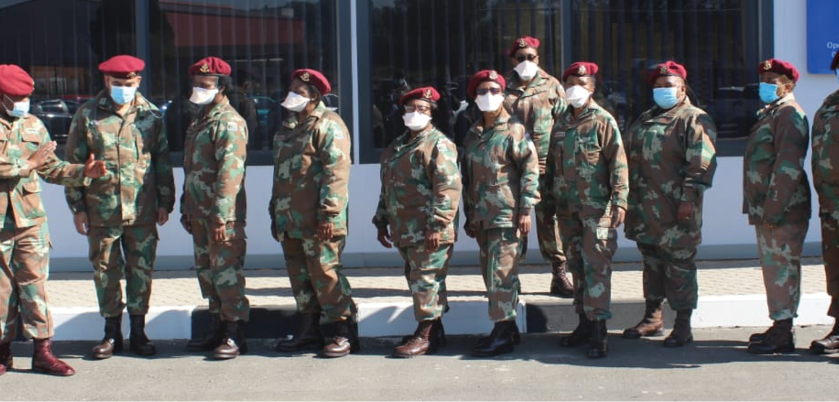
Before assuming their duties, the Medical Task Group had to be vaccinated so that they could be kept safe while handling the increased number of positive cases and hospital admissions.
Medical Task Group Commander Colonel Fezeka Mabona, who is a professional nurse, says she works on the ground with other members of the group.
“The group comprises various healthcare professionals, including nurses, doctors, clinical associates and occupational health and safety professionals,” she says.
The majority of the nurses have nursing qualifications at the degree level, with different specialities, including primary healthcare.
“Some nurses are theatre trained. All of us have worked as general nurses, midwives, nurse educators and managers in both the military and public health system,” she adds.
The group is divided into task teams and work with the hospital staff in shifts, according to the demand at the facility. The team is currently providing healthcare services in six wards.
“The hospital staff is quite low to handle the number of cases at the moment. It is very important for us to try as much as we can to assist them in order for all of us to avoid further strain on the healthcare system,” says Mabona.
She adds that the team spirit between nurses from the SANDF and the public healthcare system has been positive so far.
Due to the increase in COVID-19 cases, the hospital is also expected to receive more beds, to increase its 96-bed capacity to accommodate more patients.
South Africans unite to rebuild
South Africans unite to rebuild vuyelwanSouth Africans have come out out in full force to support each other, clean up and rebuild businesses that were affected by the civil unrest in July.
The country went through a difficult period recently, when many malls, shopping centres, factories, warehouses and businesses in KwaZulu-Natal and Gauteng were looted. Some were even torched and burnt to the ground.
While the government and private sector were assessing the damage and putting together recovery plans, thousands of ordinary South Africans teamed up to clean up and start rebuilding what had been lost.
Social media mobilises citizens
Social media groups were started to mobilise citizens to go to affected areas near them to help. They were cautioned not to enter businesses’ premises, to ensure that investigations into the looting and their resulting insurance claims were not compromised.
Social activist Siyanda Ntenga joined students residing in the Durban CBD, local minibus taxi operators and the public who were getting their hands dirty to help the community.
They spent an entire week cleaning various streets and each day inspired more people to come and help.
“We started as a few people but, as we kept going, more people joined. We were happy to see owners of small, foreign-owned shops coming out to join us. It was the most beautiful thing to watch,” says Ntenga.
He adds that besides his love for community service, he was driven by the worry that the more time it took to clean up the city, the longer many families would have no income as businesses would not be operating.
Citizens play their part
Diana Khumalo, one of the students who participated in the clean-up campaign, says she could not wait for municipal services, which had a backlog, to clean up, and felt a need to play her part in restoring order to the city.
“I love my city and seeing it destroyed was heart-breaking. Instead of just sitting inside and watching all the trash pile up, I decided to join those cleaning up. Many hands make light work, as they say.” 
Zukiswa Macingwane enjoys baking in her spare time. When no shops were opened and people were worried about supplies, she baked bread and handed it out for free.
“I believe in the human heart. Making bread and sharing it with others showed that it is not over, the human heart can still triumph and together we can get over this© We don’t have to be separated,” she says.
Macingwane also joined one of the clean-up campaigns, after seeing a call on social media.
Although she knew none of the people she was cleaning with, she says they worked as a team because they shared passion to see life going back to normal in the city.
“What happened was hard on everybody. Some lost their source of income, some their businesses and some their loved ones, who died during the mayhem.
“Some analysts are painting a gloomy picture of what we are to become, but I am positive we will rise above it all,” she says.
Rebuilding SA
In Gauteng, Soweto resident Emelda Masango started a social media page called RebuildSA, to ask people to offer any form of help they could to clean up after the chaos.
The group recruited volunteers, who went out to clean up looted shops and shopping centres.
Some people donated food and money, while others coordinated information to share with the public so that they knew which shops were open and where they could buy groceries.
“We had many volunteers and donors pulling their weight and we made a difference.
“It was bad. There were old people and children who just could not cope with the vandalism and looting they saw© It was traumatic for them,” says Masango.
Besides the clean-up campaigns, people offered their services to small businesses to help them build back up so that they could again employ locals.
Other people arranged food banks to help the needy get the food that they so desperately needed.
Acting Minister in The Presidency Khumbudzo Ntshavheni says government appreciates all of the South Africans who displayed the spirit of ubuntu.
“We thank the business sector (big and small) which partnered with government to ensure continued operations of the South African economy and critical supplies; political leadership from all political parties, for putting political differences aside for the benefit of our beloved country; and traditional and interfaith leaders, for partnering with government to call for calm in our communities,” she says.
Stevie takes on COVID-19
Stevie takes on COVID-19 BathandwaThe Faculty of Health Sciences at the University of Pretoria (UP) and Steve Biko Academic Hospital have welcomed a mobile robot called Stevie to help improve the treatment of patients during the Coronavirus Disease (COVID-19) pandemic.
Named after Steve Biko – one of the most prominent leaders during South Africa’s anti-apartheid struggle – Stevie will be vital in allowing for bedside ward rounds attended by intensive care unit (ICU) teams from across the globe.
This will be done through instant live discussion and communication daily between German and South African ICU teams.
Academic and Clinical Head of the Department of Critical Care at UP and Steve Biko Academic Hospital Professor Fathima Paruk says: “Stevie is now officially the much-adored baby of our ICU team and is stimulating much excitement throughout the hospital.”
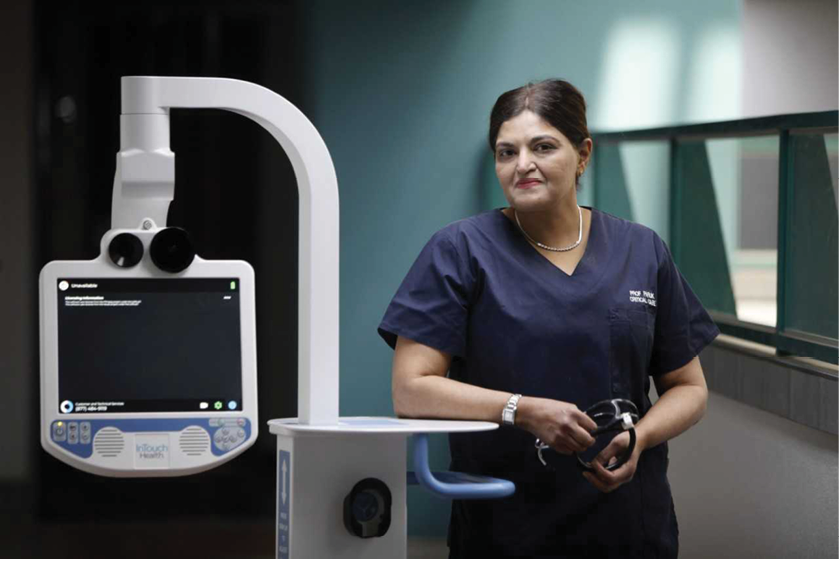 Stevie has a privacy handset which is a live phone to aid confidential communication during ward rounds and a stethoscope port where it can remotely relay information while a patient is being examined.
Stevie has a privacy handset which is a live phone to aid confidential communication during ward rounds and a stethoscope port where it can remotely relay information while a patient is being examined.
Stevie also has high-definition pan-tilt-zoom cameras which are useful for close-up diagnosis and patient care.
“ICU specialists and their teams based in Germany at Charite University and Robert Koch Institute will join the South African ICU team in person through the robot’s digital screen.
“Both the South African and German teams, led by ICU specialists, will be able to interact virtually.”
The team from Germany will be able to see the patient, look at the ICU monitors and engage in discussions with patients.
“The ward rounds will involve discussing the medical condition and a management plan over a secure line,” she adds.
Stevie will be used for the benefit of all ICU patients, including COVID-19 patients, as well as exchanging ideas, specialist training, global collaborations, webinars and educational workshops.
UP’s Faculty of Health Sciences Dean Professor Tiaan de Jager says telemedicine plays a crucial role in encouraging long-distance patient and clinician care.
He adds that COVID-19 has been a massive disruptor in healthcare and has inspired the sector to rethink its current systems and how they can be more efficient.
We are grateful to our collaborators and colleagues for ensuring that telemedicine can take centre stage and help us combat COVID-19,” he says. - SAnews.gov.za
Support for businesses and workers
Support for businesses and workers vuyelwanStarting and building a business is a lot like raising a family. It takes time, patience, constant support and consistent nurturing from infancy to maturity.
For many business owners, seeing a business that you grew from scratch struggling to survive, or even being forced to close its doors, is heartbreaking.
Since the onset of the COVID-19 pandemic, this has sadly been the situation facing many businesses both large and small, not just in our country but around the world.
The pandemic and the measures we have had to take to contain the spread of the virus have had a detrimental impact on businesses.
In dealing with the pandemic we have sought to adopt an evidence-based approach in both policy and practice, considering scientific research, clinical expertise and capabilities, and impact on all sectors of the population. 
We have sought to have a balance between saving lives and preserving livelihoods.
We have sought to mitigate the impact of the successive lockdown restrictions on people’s livelihoods, or risk a second and possibly worse epidemic of poverty and hunger in future.
In the earliest days last year, we introduced measures such as the COVID Temporary Employer/Employee Relief Scheme (TERS), the COVID-19 Loan Guarantee Scheme and various mechanisms to support small businesses to provide immediate and short-term relief to burdened employees and business owners.
In addition, the special COVID-19 Social Relief of Distress Grant and broadening access to existing social grants provided lifelines to indigent individuals and families.
Through these interventions we were able to mitigate the worst effects of the pandemic, preventing the closure of many businesses and the loss of even further jobs. They provided a firm foundation for the Economic Reconstruction and Recovery Plan that we launched in October last year.
As part of that plan, we introduced the Presidential Employment Stimulus to provide income and livelihood support to millions of beneficiaries.
Through the stimulus, over 300 000 young people have been placed as school assistants. More than 100 000 subsistence farmers are registered on the first-ever database of its kind where they have access to technical support.
More than 30 000 young people have been given opportunities in the cultural, creative and sports sectors. Young professionals have been given opportunities in infrastructure development, healthcare, environmental conservation and a number of other sectors.
There are promising indications that our economy is steadily recovering, with growth and job creation in a number of sectors, from manufacturing to mining to agriculture.
At the same time we know that this ‘bigger picture’ is cold comfort to workers and business owners who have suffered immeasurably over the past year and a half, and were hoping to see their situations improve as the economy slowly opened up.
The rapid rise in infections being fueled by the new Delta variant necessitated the imposing of tighter restrictions on the movement of persons, on the operation of certain businesses and on public gatherings, among others.
These were not been easy decisions to make, mindful of their impact on people’s livelihoods.
Just as we did at the beginning of the pandemic, we engaged in deliberations with all social partners, business, labour and civil society to see what financially sustainable measures we could introduce to support businesses and individuals in distress at this time.
The negotiations at the National Economic Development and Labour Council resulted in consensus that the most practical and financially sustainable measure that can provide urgent relief is extending the COVID-19 TERS scheme to sectors that have been affected by the adjusted level 4 restrictions.
To support businesses whose operating licenses and permits expired between March 2020 and June 2021, we are extending their validity until 31 December 2022.
In addition, new business licenses or permits that are issued from the 1 July will also be valid until 31 December 2022, and no license fee will be payable.
Over the past year, we have also been working consistently to protect vulnerable workers whose jobs were at risk, particularly in hard-hit sectors like retail, food and beverage and the metals industry.
Through processes facilitated by the Commission for Conciliation, Mediation and Arbitration, some 58 000 jobs have been saved.
With the pandemic showing no immediate signs of ending, businesses and workers remain vulnerable.
It is thanks to the social compacts we continue to forge that government, business and labour have been able to work together to buffer workers and businesses from the pandemic’s harsh economic impacts.
For now, our priority is saving lives, and ensuring that we provide the necessary support, within our means, to prevent more businesses closing down and more jobs being lost.
As we did with the COVID-19 TERS scheme, government is firmly committed to continue its engagements with business and labour to find a way through these distressing times that both saves lives and protects livelihoods.
Tshepiso Ledwaba hits the right notes
Tshepiso Ledwaba hits the right notes UrsulaSoshanguve born teacher and musician Tshepiso Ledwaba, who became the first black Steinway piano-approved technician in Africa in 2019, is one of the most highly trained technicians in the world. 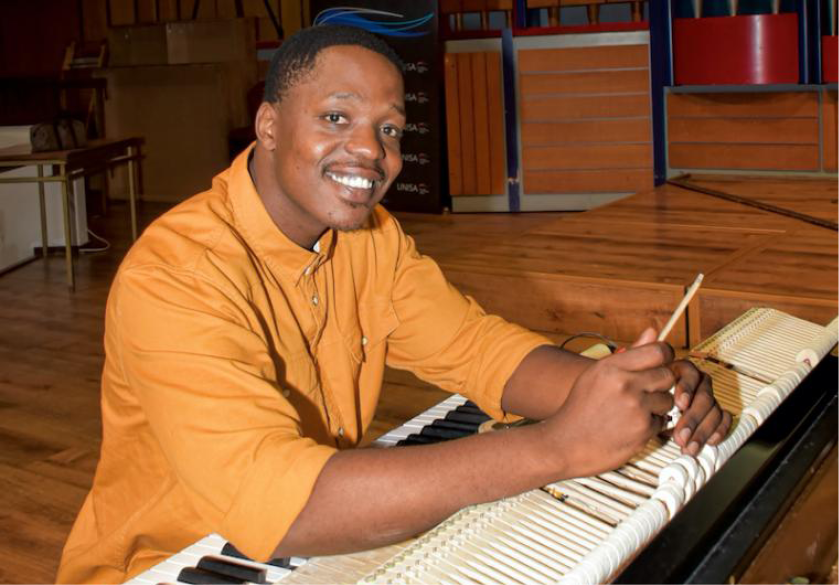
Ledwaba, who now lives in Tshwane, has been playing music since 2004 and has the sought after certified skill of repairing, maintaining, regulating and tuning pianos.
“I started my music journey at Boepathutse Junior Secondary School, when we started getting theory of music and recorded lessons from the University of South Africa’s (UNISA) Music Foundation. I first played the recorder and then the clarinet,” says Ledwaba.
In 2010, UNISA offered him a teaching contract and an opportunity to train young, black piano tuners.
John Cavanaugh, the Dir- ector of the Artist Diploma in Piano Technology at Oberlin College and Conservatory in Cleveland, Ohio, offered Ledwaba a full scholarship as a Steinway piano technician, while Unisa funded his travel and living expenses.
“I had extensive training for three years, working in partnership with piano makers Steinway & Sons, to help bridge the gap of competent technicians in piano technologies.
“Cavanaugh doubled as my mentor and instructor. Then I did my technical training in piano tuning, repair and maintenance,” says Ledwaba.
Motivated by Ledwaba’s success, UNISA has approved the creation of the Unisa Piano Repair Centre with Ledwaba as head technician. The centre will manage all of Unisa’s pianos and repair and service pianos for external clients.
“My job is to repair, maintain, regulate and tune pianos. This kind of work has been done mostly by white people in South Africa. Black people who were fortunate to get into the business, got minimal training,” says Ledwaba.
He adds that the country needs more well-trained, articulate technicians.
“Young people should follow what they are most passionate about, but also take up an activity in the arts.
“I think the arts really help with the stresses of unemployment and poverty in one’s life and it gives you a reason to get someone engaged in what you do,” says Ledwaba.
Two degrees for Dr Perekeme Mutu
Two degrees for Dr Perekeme Mutu BathandwaDr Perekeme Mutu has achieved what not many could even dream possible. He recently graduated with not one, but two university degrees – achieved simultaneously.
By working odd jobs at a car wash and later as a night-time security guard to fund his studies, Mutu has proven that resilience is the key to academic success. 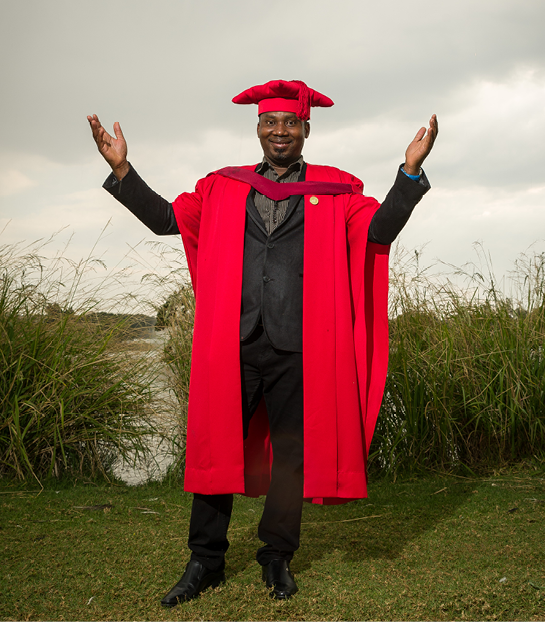
He recently graduated with a Bachelor of Law (LLB) degree from the University of South Africa (UNISA)and a Doctor of Philosophy (PhD) (Law) degree from the University of Pretoria (UP).
“The end is always rewarding,” says Mutu, who believes in the power of education to change one’s life and the value of a strong support system.
“My parents were not educated. However, I was inspired by my niece who also has a PhD and whose husband is a medical doctor.
“She supported me from the beginning, when I first came to the country [from Nigeria in 2007] and began my academic journey.
Mutu adds that his first degree from UP, a bachelor’s degree in political science was a challenging experience.
“Everything was different, from cultural differences to the functioning of the library system© I had very little knowledge of how to use a computer,” he says.
Even when he realised he lacked the funds to pay his second-year tuition fees, Mutu wasn’t discouraged, and instead looked for odd jobs.
“Most often I finished my studies for the day at 4pm. After that, I would go to the car wash to wash cars until about 7pm. At the end of the week, I paid whatever I could into my university account,” he says.
While working limited his study time and affected his first-year academic performance, Mutu still counted his blessings.
“My niece accommodated me so I didn’t have to worry about accommodation or food. My sole focus was to raise money for my fees.”
In his second year, Mutu found work as a security guard, which paid better and he was able to put more money into his student account.
In 2014, after completing his undergraduate and postgraduate degrees, Mutu joined UP’s Centre for Human Rights and started studying towards a Master of Philosophy degree in Multidisciplinary Human Rights.
When the opportunity arose to do his PhD, due to a UP bursary, he took on his LLB simultaneously at UNISA.
Of his achievements he says: “You have to be mentally and physically prepared for the journey ahead.”
Vaccination programme going strong
Vaccination programme going strong BathandwaMillions of South Africans over the age of 35 have signed up for their Coronavirus Disease (COVID-19) vaccine as the country’s vaccination programme continues to expand to include more categories of people.
From mid-July, the Electronic Vaccination Data System (EVDS) has been opened for registration for those over 35 years of age.
Within a day of the EVDS opening for this age group, more than a million of them had already registered for their vaccines and the number has been growing ever since.
While the vaccination of those over 35 was expected to start on 1 August, many who walked in at vaccination sites received their first vaccine.
Recently, the Department of Social Development also launched its national vaccine rollout plan for frontline workers in the Early Childhood Development (ECD) sector, including ECD practitioners and staff who work in the environment.
Essential workers in the basic education sector, police and the defence force have also been vaccinated.
President Cyril Ramaphosa said government and the private sector are working together to build additional capacity to vaccinate many more people a day.
“The Department of Health is also working with the private sector to implement workplace vaccination programmes that can expand our capacity beyond public sites.
“We are working to ensure that vaccination sites are located closer to where people live to make it easier for them,” he said.
Plans are also underway to ensure that many vaccination sites across the provinces are open six or seven days of the week.
“This will be achieved by the provision of funds for overtime and the recruitment of additional medical staff and health science students.”
The President encouraged all those who qualify for vaccination to pre-register to speed up the process at vaccination sites.
However, all sites do also allow unregistered people to walk in and be registered.
The vaccination programme has been affected by the recent unrest in some parts of the country, which resulted in some vaccination sites temporarily closing.
The Department of Health said the EVDS will automatically reschedule appointments for those who were unable to attend their appointments. The EVDS is programmed to reschedule up to two missed appointments.
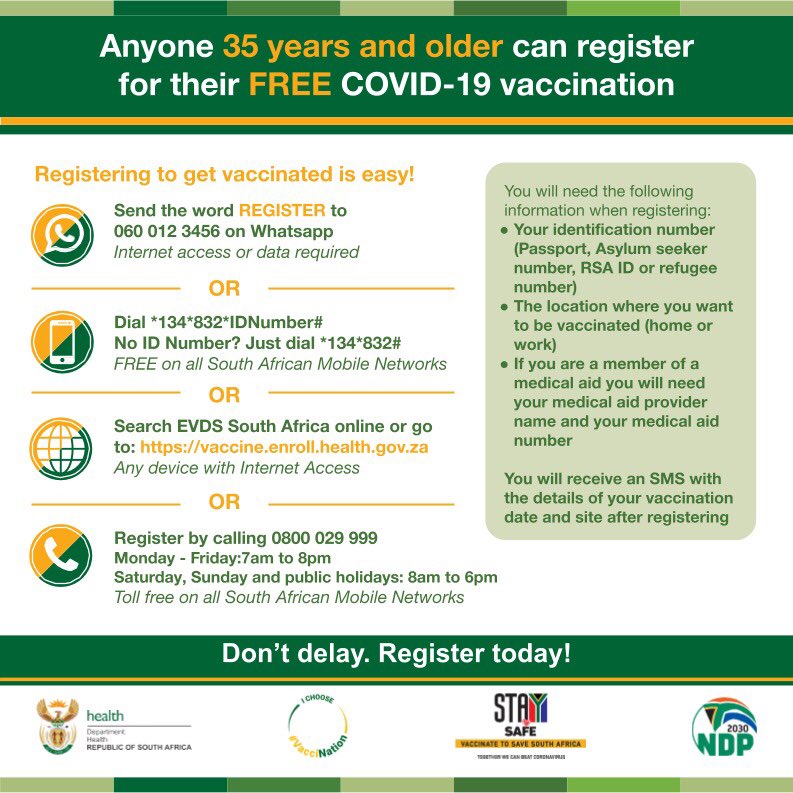
Victor Biggs documents Khoisan rock art
Victor Biggs documents Khoisan rock art UrsulaAn Eastern Cape anthropologist is hoping that ancient rock art becomes a tourist attraction in the Eastern Cape. 
A retired farmer turned anthropologist, Victor Biggs is documenting the history of Khoisan rock art in the Eastern Cape.
Biggs started the Rock Art Centre in 2003 in Thomas River, a restored historical village in Cathcart, to educate South Africans about rock art and the Khoisan.
He started the centre after realising that overseas visitors know more about our country’s rock art heritage than South Africans do.
The centre contains a collection of photographs of rock art and artefacts from over
200 cave sites that Biggs has explored over the years.
“We have a treasure trove of rock art in the Eastern Cape that is probably unequalled anywhere in the world,” he says.
Unless it is looked after, it will be lost to the province, Biggs adds.
The Rock Art Centre has been designed to reflect the feeling of being inside a cave, with the entrance and walls painted like an original cave site.
“I collect artefacts in the veld. I have never removed any from caves or shelters, and I encourage people not to do this,” he says.
Biggs was drawn into the world of rock art when he was young and says it started as a hobby that has now developed into an obsession.
The first forms of rock art were identified in South Africa about 350 years ago and the country’s oldest known rock art is about 3 000 years old.
Biggs says rock art was not just a way of decorating the caves that were home to the Khoisan people, but was also their connection to the spirit world.
There are hundreds of rock art sites in South Africa, which are protected and studied by anthropologists from across the globe.